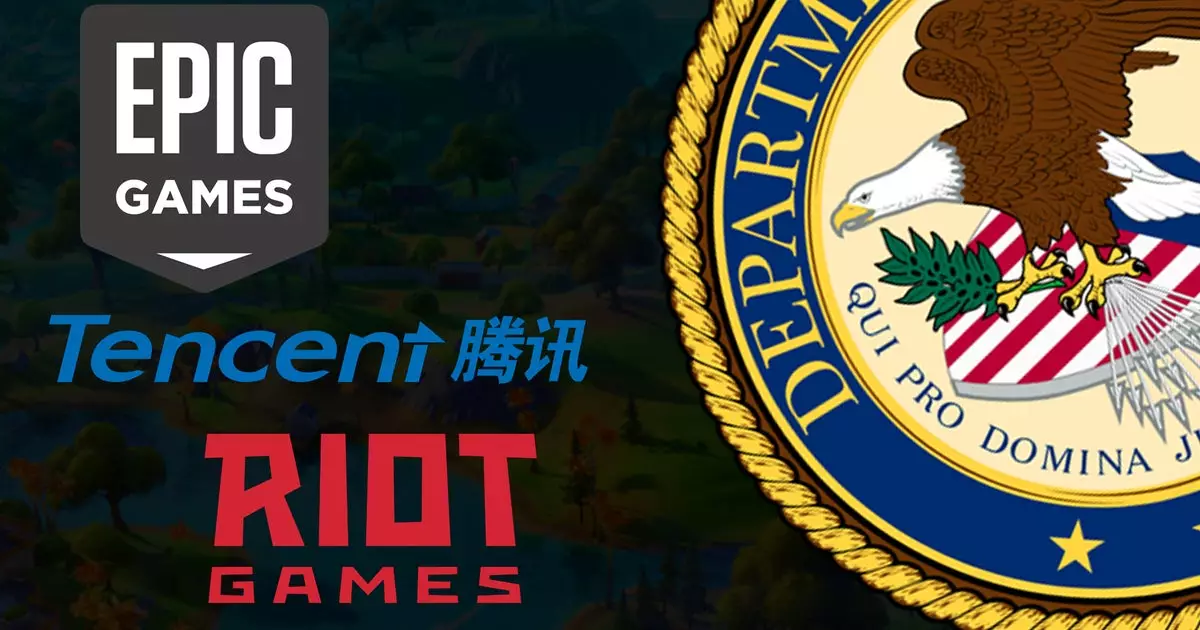The gaming industry, notorious for its rapid evolution and fierce competitive landscape, recently found itself at the center of a significant governance issue involving Epic Games. Two directors associated with Epic have resigned amidst an investigation by the U.S. Department of Justice (DoJ) focusing on potential antitrust violations. This situation raises critical questions not only about corporate governance but also the broader implications of monopolistic practices within powerful entities in the gaming sector.
The resignations of Ben Feder and David Wallerstein from the board of Epic Games are a direct result of concerns that Tencent, which holds a minority stake in Epic, exercised undue influence over the company’s strategic direction. The DoJ’s investigation indicates a glaring conflict of interest—as Tencent also fully owns Riot Games, a direct competitor to Epic in the gaming arena. The comparison made by the department likening this situation to allowing a senior executive from Pepsi to participate in Coca-Cola’s decision-making underscores the ridiculousness of the situation. Such a scenario would be seen as a clear violation of fair business practices, and the implications extend beyond mere ethical considerations into legal territory.
Central to this case is the Clayton Act, a pivotal piece of legislation designed to enhance competition by prohibiting individuals from sitting on the boards of competing companies. The Act aims to thwart any potential monopolistic behaviors and maintain a level playing field in various industries, including gaming. The ongoing scrutiny has compelled Tencent to revise its shareholder agreement with Epic Games, thereby restricting its ability to nominate directors to Epic’s board in the future. This move represents a crucial step towards maintaining corporate integrity and accountability within the gaming sector.
The ramifications of this investigation extend far beyond just Epic Games and Tencent. This incident serves as a crucial reminder of the need for vigilance and ethical governance in an industry that commands significant influence over millions of consumers worldwide. With two high-profile resignations under the shadow of a federal investigation, it becomes evident that even the giants of the gaming industry are not immune to the legal frameworks designed to promote fair competition.
As the gaming landscape continues to evolve, more companies might need to re-evaluate their governance structures and compliance protocols to mitigate risks related to antitrust violations. The potential for conflicts of interest, especially in industries characterized by rapid consolidation, makes it imperative for companies to establish clear boundaries regarding board appointments and decision-making processes.
Antitrust issues aren’t new to the gaming industry. We’ve witnessed other significant antitrust challenges, including Valve facing lawsuits and Microsoft’s intense scrutiny when it sought to acquire Activision Blizzard. These instances reveal an unsettling trend where large corporations often clash with regulatory bodies trying to uphold fair competition. The current landscape necessitates ongoing dialogue about the role of regulation in a swiftly changing digital era, especially as monopolies loom large over various tech-driven industries.
With regulators closely monitoring these developments, the future of business conduct in the gaming sector may become subject to stricter scrutiny. Companies must prioritize transparent governance practices to avoid legal pitfalls while establishing themselves as ethical corporate citizens in a competitive marketplace.
Ultimately, the Epic Games boardroom resignations serve as a wake-up call. They indicate a need for reassessment and possible reformation of corporate governance protocols not only within gaming companies but across all sectors affected by similar market dynamics. By learning from these events, corporations can foster an environment that emphasizes ethical behavior, fairness, and ultimately, a healthier competitive landscape.
The intersection of gaming, corporate governance, and antitrust laws presents a complex but crucial narrative as we move forward. The current situation with Epic Games acts as a case study on the vital importance of maintaining a fair playing field where innovation and competition can thrive without the weight of monopolistic practices. As the industry continues to navigate these waters, it becomes increasingly clear that ethical governance must remain a cornerstone of corporate identity, driving not just profitability, but also industry integrity.


Leave a Reply